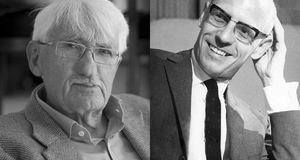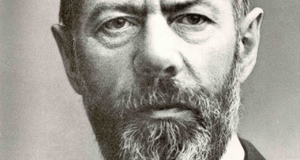Featured Article:Defining the Legitimacy and Power of the State Through Weber and Foucault
By
2016, Vol. 8 No. 05 | pg. 2/2 | « According to Foucault, the modern state takes measures to secure its social body, or its population, through various techniques including the use of knowledge.104 To Foucault, the state facilitates conditions for institutions to use their authority over specific fields of knowledge as arising not from all of a population being in agreement with those organizations’ claims of authority, rather the phenomena of the social body is a product of the material power wielded by institutions and the state.105 In other words, the state engenders the conditions that shape peoples’ understanding of their world around them by making use of institutions that use forms of knowledge that have physically coercive effects on people.106 Furthermore, the state and the institutions it houses, by contributing to people’s understanding of the world around them, also have effects on one’s self-awareness, including the recognition of one’s body as something that they can control.107 Foucault claims that the state regulates this desire that one has to be governor of their body, by acting as a kind of super-ego that issues standards of behavior that ultimately influence one at the level of desire and knowledge.108 Hence, the state affects the shaping of people’s minds by its methods of normalizing their bodies, which it does through the use of schools, hospitals, jails, and other micro-level institutions.109 It is also worth noting that Foucault believes the general reality produced by the state and institutions is one of repression and oppression.110 What repression and oppression derive from is the state’s continuation of past wars and struggles by using seemingly peaceful means, that place burdens on its people.111 For example, after a long war, it is not uncommon that taxes increase and that people from both the winning and losing states feel the brunt of wars they may have never physically fought.112 In turn, the state, which would be the collector and manager of that tax money, can very well use those tax revenues as a way to repress, or make sure that no one will challenge, in this example, the legitimacy of the state’s right to tax.113More importantly, those retributive policies to restore the state to its previous form, before that war occurred, is the people’s burden, which Foucault would claim is a kind of oppression.114 Furthermore, Foucault mentions that contractual theories of the state’s legitimacy which emerged in the past, are presently tainted by the realities of repression and oppression.115 He claims that oppression is the state or its people, overstepping the boundaries of the social contract, and thus, rendering that contract to not be what it once was.116 Also, repression which derives from the continuation of war, even after the physical events that define it are over, is due precisely because of the policies that continue wars in a covert fashion.117 Finally, these ways in which the state oppresses and represses its people, tie into the use of knowledge as a means to legitimate the state’s actions.118 To Foucault, right, truth, and power overlap in an interesting way. To him, the rules of law, or right, creates barriers on power, yet truth, which derives from knowledge, helps to perpetuate the remaining lawful power that is left.119 In other words, the law places limits on power, and what remains of that power, continues through discourses of knowledge and truth.120 Needless to say, relations of power influence the production of knowledge, and the way in which one can analyze power is within the paradigm available to them.121 At the same time, power relies on the establishment of fields of knowledge, so that truth may also be readily available to the state.122 Foucault believes that through the accumulation, circulation, and dissemination of knowledge, both those who hold power and those who are subject to power each gain a form of power through the discovery of truth.123 Therefore, one may infer that to Foucault, power influences truth and truths enable people to exercise their power to limit the use of power by the state.124 Also, Foucault claims that theories of truth help to legitimate the power of the state, as in the case of theories of law as well as those concerning sovereignty.125 Theories concerning right and sovereignty contribute to obscuring the fact that domination and its effects do exist because those theories, in reality, help to legitimate the brutality of the state by covering it up with the use of truth to justify its actions.126 To discover the abuse and brutality of the state, Foucault claims that it is integral that one analyzes the extreme cases of the use of state power when it comes close to defying right or law.127 He believes this because extreme uses of power help to reveal the less obvious methods of control that happen at more local, and thus, more anonymous levels.128 Furthermore, the overlap of right, power, and truth, helps to achieve the state’s ends because right and truth contribute to defining what society views as being normal and abnormal.129 Hence, the exclusion of those regarded as being outside of the norms of society is necessary for the survival of practices such as surveillance, medicalization, incarceration, and other micro-mechanisms of power used by the state, through institutions, as a means to control.130 Finally, Foucault claims that by these mechanisms and techniques of using knowledge to assert power, the state is in a better position to perpetuate and increase its control over its people. Thus far I have tried to describe Weber’s views on the state and legitimation. By drawing from the works of Foucault, I have hoped to at least suggest that there are other forms of power that the state has sole authority over and that these powers help to persevere the state’s legitimacy. I will now argue that Foucault’s broader view of the power of the state, and knowledge’s role in how the state asserts its authority, trumps Weber’s more narrow definition of the state and its legitimacy. Weber equates what is only in the power of the state to do, as being its defining attributes.131 In other words, the acts that are only in the right of the state to perform helps to legitimize the state because no other institution within it can exert or exceed its specific powers. Furthermore, he states that the specific power that the state has, which is its position as the source and executor of the legitimate use of violence, is justifiable under tradition, charisma, and reason.132 How can one claim that the state only has a monopoly on the legitimate use of force, when it uses knowledge, which is not a physical form of violence, to discipline its people? I believe a good answer to this question would begin with Foucault’s claim that because society is in a constant state of war, since wars never truly end, the mechanisms of repression and oppression do not derive from the states’ ability to monopolize legitimate violence, but rather its ability to monopolize knowledge.133 I agree with Foucault because the state’s raison d’état is a kind of immaterial blueprint which all other institutions follow by law and custom, and thus, there are limits on how much power institutions can exert over knowledge, when, in theory, the state has no such barriers.134 Furthermore, because the state has no limits to its use of knowledge, one may claim that the state monopolizes knowledge in the form of funding various institutions of education, which in turn, creates an obligation those institutions have to meet requirements and standards that the state sets. Consequently, because educational institutions thrive from the money that states allocate to them, it follows that what schools teach, Foucault would claim, has political dimensions that influence learners to obey the state.135 Also, unlike Weber, who believes that the state grants power to agencies, and in turn those institutions work towards gaining more power, Foucault believes that the state does not directly grant institutions power.136 Rather, he believes that institutions come to gain power through their obedience, and it is hard for institutions not to be obedient because the state’s raison d’état structures social reality in such a way that institutions have very little freedom to choose otherwise than to obey.137 I too agree with Foucault on this point because if one were only to follow Weber's definition, how can one account for the multiplicity of agencies that vie for power if the state granted those agencies specific powers that they cannot exceed? In other words, I find it somewhat illogical that an institution would fight for a greater share of power if the limits of their powers were previously outlined by the state. Hence, because the state does not grant power directly, but rather gives power to those institutions it deems worthy, Foucault’s description of how power works is more consistent and less problematic than Weber’s view. I too agree with Foucault’s views on the state and its institutions because of modern examples that one can use to support his claims over Weber’s. For example, military parades are shows of force that keep the people of a state obedient, but their presentation is not negative. How this example relates to Weber’s and Foucault’s views is that in Weber’s view military parades would be somewhat unexplainable because though they are in the right of the state to perform, their results do not derive from violence, and their use is not to inflict physical harm. On the other hand, Foucault would claim that military parades are a technique of government used to arouse feelings of loyalty to the state, which positively reinforces people’s obedience to their nation.138 Furthermore, regarding the administering and control of knowledge, one may look to present-day China, which places internet restrictions on its people by blocking certain content from display. Again, Weber’s definition would not apply to a case like internet restrictions, because this state power is not physically violent, yet it does assert the state’s authority. Foucault, I believe, would deal with the reality of internet restrictions by claiming that it is not only the state’s way of coercing its people to obey but that it is also a form of oppression that only the state can exert.139 Also, in the case of theocracies such as Iran, the use of religion, which is a form of belief, or knowledge, is in the power of the state to enforce. Unlike Weber, who’s definition of the state does not encompass the possibility of the state dominating the use of religion to assert its authority, Foucault’s broader understanding of the state can account for why the state uses religion to maintain its legitimacy.140 Foucault, I believe would claim that the use of religion represses people into being obedient to the state and not to question its authority, unless they intend to suffer damnation in the afterlife.141 Finally, because Foucault’s arguments can apply to realities that Weber’s claims seem to miss, I believe that one should interpret society as well as its political realities with Foucault’s perspective in mind, more so than Weber’s. With this essay, I have hoped to describe Weber and Foucault’s views of the state and its powers. Furthermore, by describing Weber’s views of the state and its legitimacy, I have intended to show that his definitions of the state, though presented as universally binding, fails to meet the current realities states and subjects face in regards to the struggle for power. By explicating Foucault’s views, I have intended to show how his explanation of how states’ exert their power, shows that other attributes, such as the use of knowledge, are also assignable to the state. Finally, by arguing in favor of Foucault’s more robust definition of the state and its powers, I believe that he, by illuminating other aspects of the state’s monopoly on power, is closer to defining the state and its legitimization techniques than Weber. ReferencesWeber, Max. Gerth & Mills eds. “Politics as a Vocation” in From Max Weber: Essays in Sociology. (New York: Routledge, 2013). Weber, Max. Gerth & Mills eds. “The Types of Authority and Imperative Coordination” in From Max Weber: Essays in Sociology. (New York: Routledge, 2013). Foucault, Michel. M. Senellart ed., G. Burchell trans. "Power/Knowledge" in Security, Territory, Population (New York: Picador, 2008). Foucault, Michel. M. Senellart ed., G. Burchell trans. "The Birth of Biopolitics" in Security, Territory, Population (New York: Picador, 2008).
Foucault, Michel. M. Senellart ed., G. Burchell trans. "Body/Power" in Security, Territory, Population (New York: Picador, 2008). Endnotes
Suggested Reading from Inquiries Journal
Inquiries Journal provides undergraduate and graduate students around the world a platform for the wide dissemination of academic work over a range of core disciplines. Representing the work of students from hundreds of institutions around the globe, Inquiries Journal's large database of academic articles is completely free. Learn more | Blog | Submit Latest in Sociology |


















